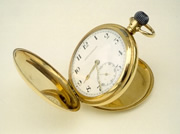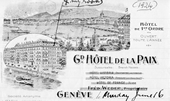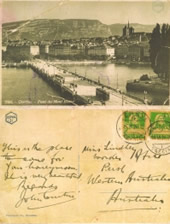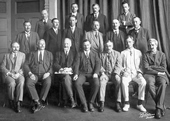

Sunday afternoon
27 January
Saturday evening
15 March
Attends open-air political meeting.
'At the conclusion of a highly successful, open-air political meeting at Northam, whereat the Labor candidate Mr L B Grieves, supported by Mr J Curtin and others, expounded the case for Labor, a big husky bush clearer remarked to an equally chesty cobber: "Do you know, I could stand here all night listening to him (one of the speakers)." "Really?" replied the other. "Then we'll have to get a tree puller to shift you after your hear Mitchell speak on Wednesday night." After exchanging two powerful, playful rib-punches, they faded away into the night, laughing uproariously.'2
Attends meeting of State Executive of the ALP.
'The President (Mr S Munsie, MLA) said he was personally very happy to know that Mr Curtin was going to Geneva. "When he gets there," said Mr Munsie, "I am sure he will hold his own. (Applause) Labor in Australia", he continued, "was very fortunate in having made such a selection, because Mr Curtin not only possessed the faculty of acquiring knowledge, he also possessed the gift of being able to impart it after he had acquired it." (Applause)'3

This watch was presented to John Curtin on the eve of his departure
as Australia’s Labour Representative to the Geneva Conference.
JCPML. Records of John Curtin. Gold pocket watch presented to John Curtin by Labour Friends (Engraved), 1924. JCPML00287/4
Attends complimentary social given by State Executive of ALP, the Parliamentary Labor Party, and the Westralian Worker in recognition of attendance at the Annual International Labor Conference of the League of Nations, in Geneva as the Labor representative of Australia.4
'For the purpose of saying "au revoir" to Mr Curtin a large crowd assembled at the Unity Theatre on the evening of Thursday, May 15. The gathering was hurriedly convened, but nevertheless the floor space for dancing was taxed, and it was noticeable that representative Laborites were there – many having come from Fremantle, Midland Junction, and intermediate suburbs.
Proceedings took the form of dancing and musical items.
During an interval, Mr Curtin was invited on to the stage, where Mr J C Willcock (Minister for Railways), at the request of Mr Mooney (Secretary Metropolitan Council), made a presentation on behalf of the State Executive of the ALP, the Parliamentary Labor Party, and the" Westralian Worker", to Mr Curtin.
Mr Willcock referred to Mr Curtin's all-round ability and capacity, and said that he had performed wonderful service for the WA Labor Movement since his arrival in 1917. Australia could not have a better representative at the Conference. As a mark of esteem and affection from WA Laborites, he handed to their guest a gold watch, suitably inscribed.
Mr S Munsie, MLA (president of the State Executive) extolled Mr Curtin's splendid qualities and said that, in his opinion, Mr Curtin knew as much about the Australian Labor Movement as any other man in the Commonwealth.
Mr A J Watts, Vice-Chairman of the Board of Directors of the "Worker" said that the choice of Mr Curtin was a happy one because he was brilliant both with voice and pen.
Mrs Green said that the WA Labor Women recognised Mr Curtin as one of the intellectuals of the Australian Labor Movement, and they desired him to convey from them fraternal greetings to overseas women of other countries, irrespective of creed and color.
Mr P Trainer said that the Geneva Conference was an international one, and that in Mr Curtin they had a delegate who understood the international viewpoint, who was in sympathy with it, and who was capable of interpreting it. On behalf of the Secretaries at the Perth Trades Hall, he had pleasure in handing him a fountain pen and silver pencil.
When Mr Curtin rose to respond three cheers were given him, followed by the singing of "For He's a Jolly Good Fellow."
He said that he felt deeply grateful to them for their very great kindness. He had spent seven years in this State and had given the Movement the best that was in him, whether winning or losing. He thought that Victor Hugo had given to mankind a fine philosophy when he likened Man's successes and adversities to the seasons: Spring, Summer, Autumn, and Winter. In the space of a few short years what looked like irreparable disaster had turned into great triumph. Upon looking back he recognised that during the first few years of his stay in Western Australia the Movement was engaged in sowing; today the harvest was being reaped. He regarded the Geneva Conference as a very important occasion, and he hoped while there to discover many economic truths which would help us in Australia toward the solving of our problems. In sending him, Australian Labor had done him more honor than he deserved, and had made him very proud, and also very humble. He did not claim to be a leader of the rank and file of the Labor Movement, but preferred to be one of them, endeavouring to interpret their desires. The Labor Movement had given great opportunities to him; it had trained him in its hardest school and had cultivated whatever abilities he possessed; it had filled him with inspiration and had made him realise that to be a man one had to love justice and stand for it. (Applause).'5Attends Westralian Worker staff send-off. During his absence the paper was edited by Mr Andrew Clementson.6
'Work was suspended in all branches of the "Worker" Office for a brief space on Friday morning, and the combined staffs foregathered in the composing room.
The Manager (Mr D Watson), in asking Mr Curtin's acceptance of a travelling bag, voiced the gratification of the staff at the selection of their Editor and colleague for such an important public duty. Knowing Mr Curtin as they did, they were satisfied that he would represent the State with credit to himself and advantage to the workers.
Mr Watson's remarks were supported by Mr Neilson (foreman), and Miss Watson, who, on behalf of the ladies of the staff, presented Mr Curtin with a pocket wallet.
In acknowledging the gifts and the kind references to himself, Mr Curtin said that of the many functions which had been arranged in connection with his impending departure, none was more pleasing to him than the testimony to the goodwill of his fellow-workers. He appreciated their gifts, but he appreciated in greater degree the fellowship and kindly thought which prompted them. He was entrusted with an important and responsible duty, and he hoped that when he returned from that duty they would have the same opinion of his fitness for the task as they so kindly expressed that day. His association with the Labor Movement had become his life's work, and if he could do anything to help the Movement forward, either in a position of prominence or as one of the rank and file, his efforts would be directed to that end. He was leaving them only for a brief period; he would return in the Spring. In the meantime, he thanked them for many kindnesses and much help during the past seven years and trusted they would continue that kindness and help when he returned and took up again the work he was now temporarily relinquishing.'7
Attends send-off from West Australian district of the Australian Journalists' Association.8
'A large number of the metropolitan journalists met at the Palace Hotel in order to have a parting glass with their President, Mr Curtin.
Mr C J Smith, of the "'Hansard" Staff, who is Vice-President of the AJA, presided. He said that for the past four years Mr Curtin had been President of the organisation, and had won the confidence and affection of its members. On behalf of the Association he had pleasure in presenting to Mr Curtin a handsome leather suit case.
Messrs Birtwistle ("West Australian"); Fry ("Sunday Times"); Lee ("Daily News"); Gates ("Truth"), supported Mr Smith's remarks, and expressed the hope that Mr Curtin would have a successful trip and that he would return to Western Australia reinvigorated physically and mentally.
The toast of the departing President's health was drank with musical honors.
Mr Curtin briefly responded and said that if in the years to come they thought half as well of him as he did of them he would be a very happy man. (Applause.)'9Sails for Europe.
'Seen on the wharf just prior to embarkation, he said he had been overwhelmed with messages of congratulation. Words were inadequate to convey his thanks and gratitude. If time had permitted he would have liked to have replied to each well-wisher, but this had been quite impossible. He had always believed in the phrase "the warm-hearted West"; now he had positive proof of it.'10
This was Curtin’s 'first and only sea trip to Europe and, given the difficulty for those of working class background to make such journeys and the broadening effect it seems to have had on his editorials, the visit was of considerable importance in helping to shape his world view.'11
En route to Europe.
Writing from Colombo Mr Curtin reported that all was well and declared that Colombo 'was a delightful place, but from what he saw of the Europeans there he concluded that its effect on the white man was enervating.'12
Writes to mother-in-law, Annie Needham.
'Dear "Grandma",
I hope you are quite well. Tomorrow I go ashore so your message that it will work out is being justified. One of the months I shall be away is finished. I am in good health & will do the work devolving on me as becomes the man who strives to be worthy of his beloved wife's mother.
I've seen many women since I left Fremantle & I bless you for having had a daughter who is a prize above rubies for any man.
I cannot write what is in my heart, but I know I am watched over by a good angel for the women of the house in which I was a son, & the women of the home in which I am a husband are pearls & precious stones beside which the wealth of Ind[ia] is as nothing. The more I reflect on the sweetness of the wife who was your little girl in the long ago, the stronger grows the affection I've always had for you and the dearer & nearer becomes in my heart the memory of what I know is most precious to you. Tons of love, there is work to do, & true happiness comes to those who tackle it. That's the faith your example has deepened.
Your loving son
xxx Jack'13
Detail from letter.
JCPML. Records of the Curtin Family. Letter from John Curtin to Elsie Curtin, 16 June 1924. JCPML00402/27.

JCPML. Records of Marjorie Finch. Postcard sent from Geneva from John Curtin to Miss Lindley at the Westralian Worker, 1924. JCPML00131/1
Arrives at Geneva.
'I got here [Gd Hotel de la Paix, Geneve] on Saturday at two PM. … It appears the city is crowded out, it being summer time, & I have had to stay at the place reserved for me by the High Commissioner. They gave [me] a swell room & my meals added would run me to £8/10/- a week. I told the manager 'too bloody high' & he knew the meaning of the second word & said he would take me to another room which with board would work out at 22 francs a day, or about £6/10-.
Switzerland is a dear place for travellers. **** I have marked my room with a cross **** . It commands a magnificent view & is fit for a king. The other room was fit for five kings. The staircase is marble & the whole place carpeted. They go in for luxury here. Of the £20 British money I brought with me for expenses, tips, going ashore at Colombo, Aden, Port Said, & the frightful bribery to get from Marseilles here, I've still got £8/10-.'15
Purchases doll for daughter, Elsie.
'I had a doll, Vera, and I called her after the Sunday School teacher, Miss Payne, Vera Payne. It was a doll that my father brought back from Geneva; a beautiful double-jointed china doll, you know, blue eyes that opened and shut, beautiful curly hair. I don’t think my mother encouraged me to play with it too much because she didn’t want it to be broken...'16
Sends postcard to Miss Lindley at the Westralian Worker.
'This is the place to come for your honeymoon. It is very beautiful. Regards John Curtin.'17

JCPML. Records of the Curtin Family. John Curtin (front, 2nd from right) with delegates to the ILO Convention, Geneva. 1924. JCPML00376/1
Attends the International Labor Conference as Labor representative of Australia.18
'They expect the conference to last about three weeks or even more & the Secty to the Australian delegation, a Major Fuhrmann, says it would be out of the question to get me a boat before the end of July. So my £3/3- a day will be paid until the officials at Australia House get me fixed up to return home. I told the Major to arrange for via the Cape. This can be done I believe. Further I am to be conveyed to London when the conference finishes. So it is not nearly so bad as I thought it would be. The weather is beautiful the air crisp & rare. The Lake is a picture, but in a hundred years the Swan River could be as good—only the buildings, esplanades, etc are lacking. The people look just like the English. They are great lovers. You can see young couples walking everywhere their arms round each other. On Saturday night I went to a casino & saw a vaudeville show run in a public gambling & dancing palace. I was with Crawford from South Africa. …. He is worse than a Nat-Labor man. I told him he would be called a scab in Australia. ….
Now for further amazing news! … Your old friends the Barlings are in Geneva & will be here for about a week. He heard there was a John Curtin from Australia among the delegates (the conference is the talk of the place) & found out this hotel. ... All the talk was about the Needhams. Is it not curious to locate them here within a day of getting here. I feel quite bucked up to find such close friends as I told them I was a Needham named Curtin because you & I were two parts of the one thing. I can quite understand why you & Grandma value them so highly as they are really delightful people. .... I must clear now. My dearest dear, my love I give you to hold for other[s] & share with the kids & Grandma. I was very proud last night to be husband to the girl I could see was really loved by those who knew her as a girl & as a woman. Kisses to you my sweet. XXX XX
Your loving husband John.'19
'Curtin’s experience in Geneva was both enlightening and frustrating, revealing the progressive possibilities of international organisations but also the severe limits under which they operated at the time.' He returned with 'a new found interest in international affairs.'20 His 'output of editorials on international affairs and more especially, European affairs, increased significantly,' after this conference.21
En route to England.
Stands 'on a boulevard in Paris remembering the feet that had died there for liberty.'22
Spends an hour at the British Museum.
Recalls 'how there men, poor and obscure, had studied and learned and had become world figures.'23
Watches cricket at Kennington Oval.
'Makepeace making a century at Kennington Oval and Warwick Armstrong at a dinner at the Regent Palace Hotel, London are his outstanding recollections.'24
Returns from Europe on Diogenes.26
'… the trip to Europe has added, I suppose, half a century to my physical
condition; mentally, however, I am inclined to take things a bit easily for the present.'27
'Asked for a few impressions [on the Conference], Mr Curtin said it was extraordinarily difficult to sift the medley of ideas he had formed into their proper classifications. The Conference itself was a veritable education. Not only did he meet the delegates of workers, employers and direct Government spokesmen, but he had associated with political and industrial leaders whose daily round was of the highest importance to the world.'Asked for a few impressions, Mr Curtin said it was extraordinarily difficult to sift the medley of ideas he had formed into their proper classifications. The Conference itself was a veritable education. Not only did he meet the delegates of workers, employers and direct Government spokesmen, but he had associated with political and industrial leaders whose daily round was of the highest importance to the world.28
Friday evening 29 August
Attends welcome home social and gives account of the Sixth International Labor Conference at Geneva, and a 'fine exposition' of the activities of Labor.
'Notwithstanding weather conditions that were very disagreeable, a large audience assembled at Unity Theatre last Friday night to hear an account of the Sixth International Labor Conference at Geneva and to welcome home Mr J. Curtin (editor of the " Worker"), who was Australia's Labor delegate to the conference.
A feature of the gathering was the fact that the platform was occupied by three Ministers of the State Labor Government.'29
Friday 12 September
9 pm
Wednesday afternoon
17 September
Delivers a short speech at a meeting organised by the WA Organisation of Labor Women to meet Mrs M Charlton, the wife of the Federal Labor Leader.
'The hall was beautifully decorated, and an artistic programme of music including songs and recitations, was rendered.'31
Sunday afternoon
21 September
Delivers a speech in company with prominent members of the Parliamentary Labor Party. 'It is expected that the Subiaco Brass Band will be in attendance.'
'The meeting was among others held, "simultaneously throughout the civilised world", however readers of the "West" on Monday were regaled with the usual hash of irrelevancies. True, there was a report on the anti-war demonstration on the Perth Esplanade, and perhaps Labor should be thankful for small courtesies.'32
Sunday afternoon
26 October
Monday evening 27 October
Friday 14 November
8 pm
Monday afternoon
24 November
Presents lecture on International Labor Organisation to university students and members of the Australian Journalists Association .
Who listened with 'a great deal of interest, … as Mr Curtin gave a sketch of Labor’s propaganda, both industrial and political, during the past 100 years in Europe, and traced the rise and fall of the First and Second Internationals.'38
6 December
7 December
Attends meeting of the Board of Directors of the People's Printing and Publishing Company "convened at the instigation of the State Executive re the action of the Seamen's Union in declaring the Editor, Mr Curtin 'black'".
Mr Holman said that as a Board the Directors had never interfered in any way with the Editor since his appointment; the only stipulation was that the platform must not be infringed! The action was due to the refusal of Mr Curtin to publish an article from Mr G. Ryce.
Mr Curtin, who was present, said that he had consulted with Mr Munsie, Gen. President, and Mr Barker, Gen. Secretary ofthe State Executive; he said he refused to publish the statement because it contained libellous matter; at their request he showed the letter to them as the State Executive were responsible for the policy of the paper. Mr Holman considered that the Directors should have been first consulted.
Mr Watts/Mr Hickey - That we express our complete confidence in Mr Curtin as Editor of the Worker and having read the letter submitted by Mr Ryce declare it to be such an untruthful and libellous character as to leave Mr Curtin no alternative but to decline to allow its publication. We further resent the attempt to defame the working class reputation of Mr Curtin in this connection and consider that his conduct is and has been such as to make the Seamen's resolution absurd and ridiculous.
Motion carried.
The Chair Mr Holman said: I agree with the essence of the resolution but I do not agree with some points of same. 41a
Curtin attended a meeting of the State Executive of the ALP on the 20 January 1925 to further discuss the matter.